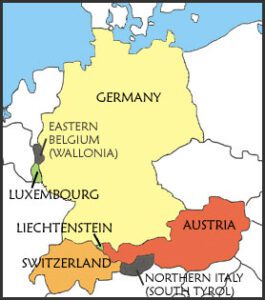In his humorous essay “The Awful German Language,” Mark Twain recounts his struggles studying German, joking that learning English takes 30 hours, learning French takes 30 days, and learning German takes 30 years.
You can prove Mark Twain wrong. Despite its complexities, German is not an impossible language for an English-speaker to learn.
Yes, on the one hand, German has 16 different ways to say “the.” German has those infamously long words that look more like a disordered alphabet than a pronounceable word.
Online German classes help you navigate such rocky grammatical terrain.
In fact, there are helpful similarities with English in terms of modals (can, should, would), preposition combinations (verb + in/on/for/etc.), and vocabulary (e.g., haus = house, kindergarten = kindergarten.) An online German class guides you to steadier grammatical ground.
Here are 5 tips to enjoy learning German more than Mark Twain did (though secretly he loved the German language–that’s why he cared enough to compose a hilarious rant.)
- Pursue your Passion: When you learn German online, connect the language to topics you’re passionate about. If you’re a classical music maven, read a bio of Beethoven or the operas of Mozart in German. If you’re a gadget junkie, browse German language tech sites like CHIP and Computer Bild. If you’ve got Wanderlust, set specific travel goals, like viewing the castles in Bavaria or chatting in a Viennese cafe. Online German classes require a regular commitment of weeks and months, so a sense of purpose prevents burn-out and fires you up.
- Learn modal verbs: One headache-inducing aspect of German grammar is the number of verb conjugations and declensions. A workaround is to use modal verbs like sollen (should) dürfen (may), and müssen (must), which assume the place of the verb and move it to the end of the sentence in its base form, freeing you up to use a wider variety of dynamic verbs without having to worry about conjugations. The best way to learn German online includes conversations about advice, obligations, and choices that require the use of modals. Not only are they useful in everyday life but they also allow you to use new verbs in a foolproof form.
- Connect cognates: Though German does not share as many cognates with English as Romance languages like Spanish and Italian, nonetheless many useful German words bear a family resemblance to English. For instance, Vater and father share a cognate, making the meaning obvious. Consider a few familiar German nouns: Haus (house), Universität (university), Planeten (planets) and Apfel (apple).

Easier still, English and German share many true friends; intelligent, blond, boss, tolerant, and wild are identical–though not pronounced the same. Beware of false friends, however; in German bald means soon, not hairless, and a wand is a wall, not a magician’s prop.
Furthermore, many basic English functional words such as be, and, my, before, and when resemble their German counterparts. The best German online course helps you make connections among cognates to build vocabulary. - Take online German classes: Learning a language is a marathon, not a sprint. A German language course online provides the structure to keep on you on a regular schedule to reach goals over the long-term.
Like physical exercise, language exercise requires regularity and persistence. Over the span of months, you experience better results by devoting a set number of hours per week to online German classes and practicing at least a little every day on your own.
Furthermore, learning a language is a social activity. The best online German classes create a communicative classroom where groups and partners work together conversing, problem solving, and collaborating on speaking, reading, writing, and listening tasks. Speaking through a headset and microphone, participants can hear each other clearly and build confidence. Plus, you don’t have to squeeze commuting time into your busy schedule. Instead of driving off to German class in a snowstorm, you just log into Zoom in the comfort of your home or office.
- Enjoy German cinema: Since the dawn of film, Germany has played a central role in world cinema. From 1930’s Der blaue Engel (The Blue Angel), which skyrocketed Marlene Dietrich as an international icon, to 2019’s Werk ohne Autor (Never Look Away), which was nominated in the Oscars Best Foreign Language Film and Best Cinematography categories, German movies span the spectrum from artsy to raunchy.
Movies may be entertaining, but you can’t watch passively–you have to study actively. Pause, rewind, replay. Reach for a dictionary. Compare the English subtitles you read to the German you hear. Observe the culture, from the details of dinner table etiquette to the tenor of World War II battle scenes. From boulevards to bunkers, movie dialogue tends to feature contemporary and conversational German, not stodgy, seldomly spoken literary Deutsche. Practice speaking the banter of onscreen characters.
Deutschland‘s filmography runs the gamut from the harrowing (think Werner Herzog, or rather, imagine his inimitable voice) to the hilarious (3 Türken & ein Baby–bet you can figure what that’s about from the title.) Netflix and The Criterion Collection are the perfect way to complement your studies while taking online German classes.
Is the German language worth learning?
Absolutely, yes! When you learn German online, you open doors to travel, study, work, and cultural opportunities.
Even a little conversational German goes a long way in forging relationships with German speakers.
Online German classes can pay off with expanded cultural experiences, career opportunities, and access to information.
- Business: Besides English, German is the most commonly spoken language in the European Union, making German useful for conducting business and advancing a corporate career. Germany boasts Europe’s largest economy, which matters post-Brexit. American firms with EU business partners value employees who take German conversation classes online.
- Science: German is the second most commonly used language in scientific research. Taking an online German course can be useful for researchers, scientists, engineers, and other professionals in STEM fields.

- Amazing words: Angst, Schadenfreude, Doppelgänger… the list goes on (and on). What fun to grapple with the epic Vergangenheitsbewältigung (coming to terms with the past).
German can describe complex ideas for which we have no equivalent word in English, so what do we do? Steal them. Where would English be without kindergarten, wunderkind, and zeitgeist? Online German classes are a playground of both new and familiar vocabulary about fascinating concepts.
- Exchange programs: Online German classes could be the first step towards becoming an exchange student. Student exchange programs in Germany provide opportunities to study, work, and leap into cultural immersion. In Berlin or Munich you could live with a German family, attend Universität, and taste authentic Bier and Shokolade. (Beer and chocolate, right?)
- Internet: German is one of the most commonly used languages online. Bookmark the tabloid Bild, the fashion site VIP, and the familiar RollingStone.de. — the domain .de ranks among the world’s most numerous. An online German course builds basic language skills to navigate the millions of German-language websites.
- University: German university is top-notch and totally free. An online German course could be a step towards attending a world-class, tuition-free university such as Technical University of Munich and Heidelberg University.
- Tourism: German-speaking tourists visit America, and American tourists visit Europe. Online German courses are a win-win for the Touristen and Touristinnen.
- Arts and Literature: The prose styles of canonical authors such as Kafka, Nietzche, and Hesse are famously (infamously) difficult to translate without losing the nuances, meaning, and beauty of the original. Centuries of great music use German, from the operas of Mozart and Wagner to the rock songs of Rammstein and Die Toten Hosen (The Dead Trousers).
You don’t have to relocate to Munich–though that would be amazing. You can take online German classes to learn how to communicate with German speakers for personal, professional, or academic purposes. Or for the purposes of Beethoven and Rammstein.
What makes German difficult to learn?
Studying German, you might relate to Mark Twain when he wrote, “Never knew before what eternity was made for. It is to give some of us a chance to learn German.”
Indeed, when you learn German for beginners, progress can feel slow, and you have to be realistic about your time-frame and level of commitment.
But then again, Mark Twain didn’t have the benefit of Zoom and bluetooth headsets. The best online German course might have inspired Mr. Twain to exercise his wit in German conversation rather than joking about his frustrations in English.
In a German online grammar course, you can tackle the teutonic tasks that Mr. Twain found so daunting:
- Three genders: German can be a difficult language to learn because all nouns are divided into three genders. The genders of the nouns will affect the other words in the sentences that you write. If you make a mistake with the gender of a noun, you will also accidentally make a mistake with the adjective that you used to describe that noun. When you learn advanced German online, you can get the hang of the genders with hands-on practice with help of an instructor.
- New sounds: German can be difficult to learn because there are some pronunciation sounds that don’t exist in English. These sounds can be difficult to reproduce when we are not acquainted with the mechanics of making the sounds.
Online German classes provide a great environment to practice these sounds thanks to the cameras and microphones. You can hear the voices of your instructor and classmates more clearly than in person or across a room. You can view the instructor making the sound, observing their lips and mouth. In this tech-related regard, German conversation classes online may be the most effective medium for pronunciation.
- Noun cases: German sentences are divided into four different noun cases. When you learn advanced German online, noun cases may boggle your mind.
Each of the four cases reflects the role of the noun in a sentence. If the noun is the subject of the sentence, this will affect the grammar in the rest of the sentence. If the noun is a direct object, the grammar for that noun will be different than if it is the indirect object of the sentence. Likewise, the grammar for the noun will be yet again different if it shows possession. Practicing the accurate use of noun cases features prominently in the best online German course.
the rest of the sentence. If the noun is a direct object, the grammar for that noun will be different than if it is the indirect object of the sentence. Likewise, the grammar for the noun will be yet again different if it shows possession. Practicing the accurate use of noun cases features prominently in the best online German course.
- Word order: Unlike English, which has a structured and rigid word order, German has a flexible word order. Changing the word order in a German sentence frequently has no effect on the meaning. In English, changing the word order of a sentence will frequently change the meaning in both large and subtle ways.
The best way to learn German online is to speak and write sentences and get immediate instructor feedback about whether or not your word order communicated the intended meaning.
- Registers: German is a language which has two distinct registers. One is for formal use in academic and business settings or with people who you respect or do not know well. In this register, not only will speakers use different vocabulary, but they will also alter the pronouns that they use when addressing people to make it clear that they are being respectful. In informal conversations between friends, family and colleagues, a more relaxed pronoun is used when addressing people.
The best way to learn German online is for an instructor to guide you through realistic role plays of formal and informal conversations. The best online German course will answer your questions about the cultural expectations of different settings and how the social contexts of conversations affect choices in register.
How long does it take to master the German language?
The Foreign Service Institute of the US Government claims that a native English speaker would need about 750 hours or 30 weeks of practice to reach a professional working proficiency level of German.
So, that’s one answer.
Another way to look at it: If you are immersed in the German language by living in a German speaking environment, and participating in a full-time intensive German program, you may be able to speak and write quite fluently after about a year.
On top of that, more concentrated study to learn advanced German online or in-person may be necessary for specific aims such as writing formal research papers, giving formal presentations in German, and doing academic work in STEM fields.
But do you need to be a Meisterin or Meister (master) and to reach your personal goals?
Participating in a part-time online German course, you may be surprised to find your feet after only a few classes. You will be able to communicate many different ideas, experiences, and emotions in German right away. Online German classes provide instant speaking opportunities with no laborious tutorials or nitpicky grammar explanations.
How come? German is a relatively easy language to begin speaking right away because the pronunciation rules are very clear and easy to follow.
It shouldn’t take long to learn how to make small talk, talk about your daily life, and share your hobbies in German conversation classes online. Your grammar may not be perfect, but your meaning will clear.
Beyond the basics, as with all languages, most of your progress will depend on the time you have to devote to the language, the methods that you use, the passion that you bring to your learning, and the reasons why you are interested in learning German.
Above all else, the thrill you take in learning German fuels your drive. As Mr. Twain wrote in a letter, “How charmed I am when I overhear a German word which I understand!”
The benefits of learning German online with a teacher
Learning German online with a teacher gives you the hands-on guidance that you lack in generic apps, slick Youtube clips, and soulless book-based programs.
An online German teacher directs individual attention to your pronunciation, grammar doubts, and cultural questions. The instructor responds in real time to your successes and struggles, offering direction, advice, and encouragement. You get opportunities to speak the language in a focused environment. Having a teacher and other classmates to interact with will keep your studies interesting and fun.
Since language is a social activity, collaborating with others is a necessary piece of any German course. You’re more likely to retain material–  words, phrases, forms–that prove useful to communicate ideas and feelings in a meaningful context. An experienced instructor creates those contexts–role plays, communication tasks, simplified but relevant audio and texts with a use activity.
words, phrases, forms–that prove useful to communicate ideas and feelings in a meaningful context. An experienced instructor creates those contexts–role plays, communication tasks, simplified but relevant audio and texts with a use activity.
As opposed to apps, online German classes create an organic, spontaneous learning environment.
In a structured but flexible online German course, you work with an instructor to acquire practical language skills that are specifically relevant to you as an individual.
Another nice advantage of online German classes is the way headsets, microphones, and computer audio clearly projects quiet speech. Hesitant speakers may come across more audibly in Zoom than in a classroom. In Zoom breakout rooms, you can work with partners without the ambient noise of a classroom and the competing chatter of other groups.
That’s not all. The Zoom screen share may be easier to view than a white board or projector in a classroom. Your teacher’s explanation is easy to hear, and you can save the Zoom chat for later reference.
It’s tough to stay motivated over time just watching Youtube tutorials and clicking through online content. When you hit a roadblock, your classmates and teacher in an online German course are there to carry you forward.
Consistency is key, and an online German course with an instructor keeps you auf dem richtigen Weg (on track, on the right way.)



 the rest of the sentence. If the noun is a direct object, the grammar for that noun will be different than if it is the indirect object of the sentence. Likewise, the grammar for the noun will be yet again different if it shows possession. Practicing the accurate use of noun cases features prominently in the best online German course.
the rest of the sentence. If the noun is a direct object, the grammar for that noun will be different than if it is the indirect object of the sentence. Likewise, the grammar for the noun will be yet again different if it shows possession. Practicing the accurate use of noun cases features prominently in the best online German course.